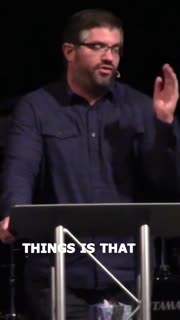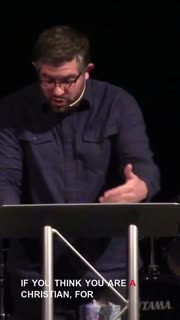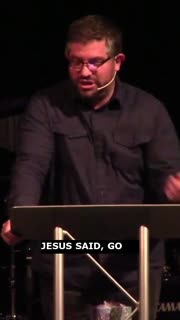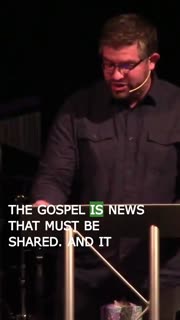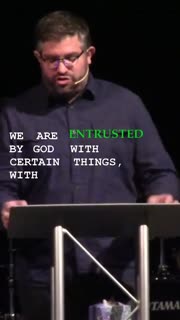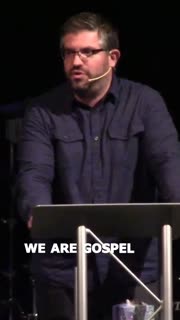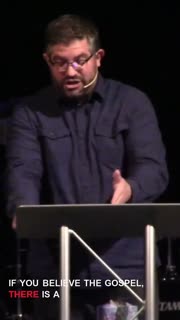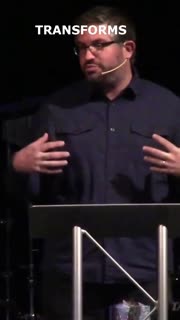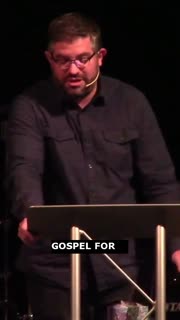Faithful Stewardship: Sharing the Gospel's Transformative Power
Summary
### Summary
Today, we conclude our series on stewardship by focusing on the stewardship of the gospel. We began by revisiting the foundational principles: the glory of God, the ownership of God, and our responsibility as His creation. The ultimate aim is to glorify God in all that we do, recognizing that everything we have is entrusted to us by Him. We explored the parable of the talents in Matthew 25, which illustrates the importance of being faithful stewards of what God has given us.
Our primary focus today is on the stewardship of the gospel. Often, when we think of stewardship, we consider our time, talents, and treasures, but the Bible also calls us to steward the gospel. In 1 Corinthians 4, Paul describes himself and other Christian leaders as servants and stewards of the mysteries of God, which refers to the gospel. This responsibility extends to all Christians, not just leaders. We are entrusted with the gospel not only for our salvation but also to share it with others.
Paul emphasizes that it is God who judges our stewardship, not human opinions or even our self-assessment. God knows our hearts and will disclose the true motivations behind our actions. This should humble us and remind us that our goal is to be found faithful before God.
We are called to respond to the gospel, walk in step with it, and proclaim it. Responding to the gospel involves repentance and faith in Jesus Christ. Walking in step with the gospel means living a life that reflects its truth, particularly in how we treat others. Proclaiming the gospel involves actively sharing it with others, ensuring that it is passed on from generation to generation.
Practically, we can steward the gospel by identifying people in our lives who need it, investing in their lives, and inviting them into disciple-making relationships. This approach helps us to be intentional in our efforts to share the gospel and make disciples.
### Key Takeaways
1. The Glory and Ownership of God: Everything we have is entrusted to us by God, and our ultimate aim is to glorify Him in all that we do. Recognizing God's ownership helps us understand that our resources, time, and talents are not ours but are given to us to manage for His glory. [50:26]
2. Faithfulness in Stewardship: The parable of the talents in Matthew 25 teaches us that faithfulness is the goal of stewardship. We are called to use what God has given us to multiply and bring glory to Him, just as the servants were expected to do with their talents. [51:10]
3. Stewardship of the Gospel: We often overlook the stewardship of the gospel, but it is crucial. We are entrusted with the gospel not just for our salvation but to share it with others. This responsibility ties together all other areas of stewardship, as everything we do should align with God's priorities. [52:14]
4. Living in Step with the Gospel: Our conduct should reflect the truth of the gospel. Paul calls out Peter in Galatians 2 for not living in step with the gospel, showing that our actions must align with our confession of faith. This means treating others with love and respect, as the gospel transforms us to be more outward-focused. [54:23]
5. Proclaiming the Gospel: Sharing the gospel is a fundamental part of our stewardship. We are called to proclaim it, ensuring that it is passed on to others. This involves being intentional in our relationships, investing in others, and inviting them into disciple-making relationships. [57:53]
### YouTube Chapters
[0:00] - Welcome
[33:02] - Introduction to Stewardship Series
[50:26] - Foundations of Stewardship
[52:14] - Stewardship of the Gospel
[53:27] - 1 Corinthians 4: Servants and Stewards
[55:07] - Responding to the Gospel
[57:53] - Proclaiming the Gospel
[01:00:02] - Obedience of Faith
[01:03:24] - Walking in Step with the Gospel
[01:07:50] - Making Disciples
[01:11:59] - Practical Steps: Identify, Invest, Invite
[01:17:17] - Closing Prayer
Study Guide
### Bible Study Discussion Guide
#### Bible Reading
1. 1 Corinthians 4:1-5: "This is how one should regard us, as servants of Christ and stewards of the mysteries of God. Moreover, it is required of stewards that they be found faithful. But with me it is a very small thing that I should be judged by you or by any human court. In fact, I do not even judge myself. For I am not aware of anything against myself, but I am not thereby acquitted. It is the Lord who judges me. Therefore do not pronounce judgment before the time, before the Lord comes, who will bring to light the things now hidden in darkness and will disclose the purposes of the heart. Then each one will receive his commendation from God."
2. Matthew 25:14-30: The Parable of the Talents.
3. Galatians 2:14: "But when I saw that their conduct was not in step with the truth of the gospel, I said to Cephas before them all, 'If you, though a Jew, live like a Gentile and not like a Jew, how can you force the Gentiles to live like Jews?'"
#### Observation Questions
1. What are the three foundational principles of stewardship mentioned in the sermon? ([50:26])
2. According to 1 Corinthians 4, how does Paul describe himself and other Christian leaders? ([53:27])
3. In the Parable of the Talents (Matthew 25), what were the servants expected to do with what they were given? ([51:10])
4. What does Paul mean when he says that our conduct should be "in step with the truth of the gospel" in Galatians 2:14? ([54:23])
#### Interpretation Questions
1. How does recognizing God's ownership of everything we have change our perspective on stewardship? ([50:48])
2. Why is it important to understand that God, not humans, judges our stewardship? How does this affect our actions and motivations? ([55:54])
3. What does it mean to be a faithful steward of the gospel, and how does this responsibility extend to all Christians, not just leaders? ([52:14])
4. How can our actions reflect whether we are living "in step with the truth of the gospel"? Provide examples from the sermon. ([54:23])
#### Application Questions
1. Reflect on your own life: How do you currently use your time, talents, and treasures? Are there areas where you can better align them with God's priorities? ([52:56])
2. Identify one person in your life who needs the gospel. What practical steps can you take this week to invest in their life and share the gospel with them? ([01:13:16])
3. Think about a recent situation where your actions did not reflect the truth of the gospel. How can you correct this and ensure your conduct aligns with your faith in the future? ([54:23])
4. How can you be more intentional in proclaiming the gospel in your daily interactions? What specific actions can you take to share the good news with others? ([01:09:05])
5. Consider the concept of "walking in step with the gospel." What changes can you make in your relationships and interactions to better reflect the love and truth of the gospel? ([01:06:22])
6. How can you ensure that the gospel is passed on to the next generation? What role can you play in disciple-making relationships within your community? ([01:10:34])
7. Reflect on the idea that God knows the true motivations of our hearts. How can this awareness humble you and guide you to be a more faithful steward of the gospel? ([56:22])
Devotional
Day 1: Recognizing God's Ownership and Glory
Everything we have is entrusted to us by God, and our ultimate aim is to glorify Him in all that we do. Recognizing God's ownership helps us understand that our resources, time, and talents are not ours but are given to us to manage for His glory. This foundational principle sets the stage for all aspects of stewardship, reminding us that we are caretakers of God's creation and His blessings.
When we acknowledge that God owns everything, it changes our perspective on how we use our resources. We begin to see our time, talents, and treasures as tools to honor God and serve others. This mindset shift encourages us to be more intentional and purposeful in our daily lives, seeking ways to glorify God in all that we do. [50:26]
1 Corinthians 10:31 (ESV): "So, whether you eat or drink, or whatever you do, do all to the glory of God."
Reflection: How can you use your time, talents, and resources today to glorify God in a specific way?
Day 2: Faithfulness in Stewardship
The parable of the talents in Matthew 25 teaches us that faithfulness is the goal of stewardship. We are called to use what God has given us to multiply and bring glory to Him, just as the servants were expected to do with their talents. This parable emphasizes the importance of being diligent and responsible with the gifts and opportunities God has entrusted to us.
Faithfulness in stewardship means actively seeking ways to grow and develop what we have been given. It involves taking risks, making wise decisions, and being accountable for our actions. By doing so, we demonstrate our trust in God's provision and our commitment to His purposes. [51:10]
Matthew 25:21 (ESV): "His master said to him, ‘Well done, good and faithful servant. You have been faithful over a little; I will set you over much. Enter into the joy of your master.’"
Reflection: What is one specific talent or resource you have that you can use more faithfully for God's glory?
Day 3: Stewardship of the Gospel
We often overlook the stewardship of the gospel, but it is crucial. We are entrusted with the gospel not just for our salvation but to share it with others. This responsibility ties together all other areas of stewardship, as everything we do should align with God's priorities. The gospel is the most precious gift we have received, and we are called to be its faithful stewards.
Being a steward of the gospel means living out its truth in our daily lives and actively sharing it with others. It involves being intentional in our relationships, looking for opportunities to share the good news, and investing in the spiritual growth of those around us. [52:14]
1 Corinthians 4:1-2 (ESV): "This is how one should regard us, as servants of Christ and stewards of the mysteries of God. Moreover, it is required of stewards that they be found faithful."
Reflection: Who in your life needs to hear the gospel, and how can you intentionally share it with them this week?
Day 4: Living in Step with the Gospel
Our conduct should reflect the truth of the gospel. Paul calls out Peter in Galatians 2 for not living in step with the gospel, showing that our actions must align with our confession of faith. This means treating others with love and respect, as the gospel transforms us to be more outward-focused. Living in step with the gospel involves a daily commitment to embody its principles in our interactions and decisions.
When we live in step with the gospel, we become a living testimony of its power and truth. Our lives should be marked by integrity, compassion, and a genuine love for others. This alignment between our beliefs and actions not only honors God but also draws others to the transformative message of the gospel. [54:23]
Galatians 2:14 (ESV): "But when I saw that their conduct was not in step with the truth of the gospel, I said to Cephas before them all, 'If you, though a Jew, live like a Gentile and not like a Jew, how can you force the Gentiles to live like Jews?'"
Reflection: In what specific ways can you ensure that your actions today align with the truth of the gospel?
Day 5: Proclaiming the Gospel
Sharing the gospel is a fundamental part of our stewardship. We are called to proclaim it, ensuring that it is passed on to others. This involves being intentional in our relationships, investing in others, and inviting them into disciple-making relationships. Proclaiming the gospel is not just about words but also about demonstrating its power through our lives.
To effectively proclaim the gospel, we must be willing to step out of our comfort zones and engage with those around us. This requires building genuine relationships, listening to others' stories, and sharing our own experiences of God's grace. By doing so, we create opportunities for the gospel to take root and flourish in the lives of others. [57:53]
2 Timothy 2:2 (ESV): "And what you have heard from me in the presence of many witnesses entrust to faithful men, who will be able to teach others also."
Reflection: Who can you invest in and invite into a disciple-making relationship this week? How can you start that conversation?
Quotes
### Quotes for Outreach
1. "The aim of all things is that God be glorified. Uh, he is God. We are not, and that we exist for him, not the other way around. And so we, we, we desire for God to be glorified in all that we do." [50:26] (10 seconds)
2. "If you think you are a Christian, for any other reason besides what the Bible says makes people Christians, then you are deceived. If you would say, I'm a Christian, but this is not real in your life. You have not responded to the one true gospel of Jesus Christ, then you are deceived." [59:06] (20 seconds)
3. "The gospel is the good news of Jesus's life, death, and resurrection. It is a call to sinners like me and you to be saved from our sin. It is the way that God has provided, the only way to be rescued from our sin and the penalty that we deserve." [01:01:37] (19 seconds)
4. "Jesus said, go make disciples. We go and make disciples by proclaiming the truth of the gospel. Teaching them all that Jesus has commanded." [01:07:50] (9 seconds)
5. "The gospel is news that must be shared. And it must be shared so that people respond and become Christians. So that others who need the gospel, just like you need the gospel, may be saved." [01:09:05] (12 seconds)
### Quotes for Members
1. "We are entrusted by God with certain things, with everything that we have. And we've looked at a few specific areas of stewardship these past few weeks. We've looked at the area of our time. We looked at stewarding our bodies and we looked at stewarding our money." [51:38] (13 seconds)
2. "We are gospel stewards. I don't think it's an area of stewardship that people often think of when they think about stewardship. Like when we think about stewardship, we automatically go to our time, talents and treasures and those kinds of things. And those are good and right, but we don't think about the stewardship of the gospel, but the Bible certainly speaks to it quite a bit." [52:14] (22 seconds)
3. "If you believe the gospel, there is a walk, a way of life that lines up with that truth. And this is part of our stewardship of the gospel. Because if we say we are gospel people, and people who don't know Christ don't see us living that out in reality, then we're not being good stewards of the gospel." [01:05:48] (18 seconds)
4. "The gospel transforms us into a more self-focused into people who are less inward-focused and more outward-focused. And when we see ourselves living for ourselves more than for others, we must recognize it and call it what it is, that it's living out of step with the truth of the gospel." [01:06:22] (18 seconds)
5. "We proclaim the gospel for people to be saved. And we proclaim the gospel for it to be passed on from generation to generation. And that's good stewardship of the good deposit of the gospel." [01:10:34] (14 seconds)
